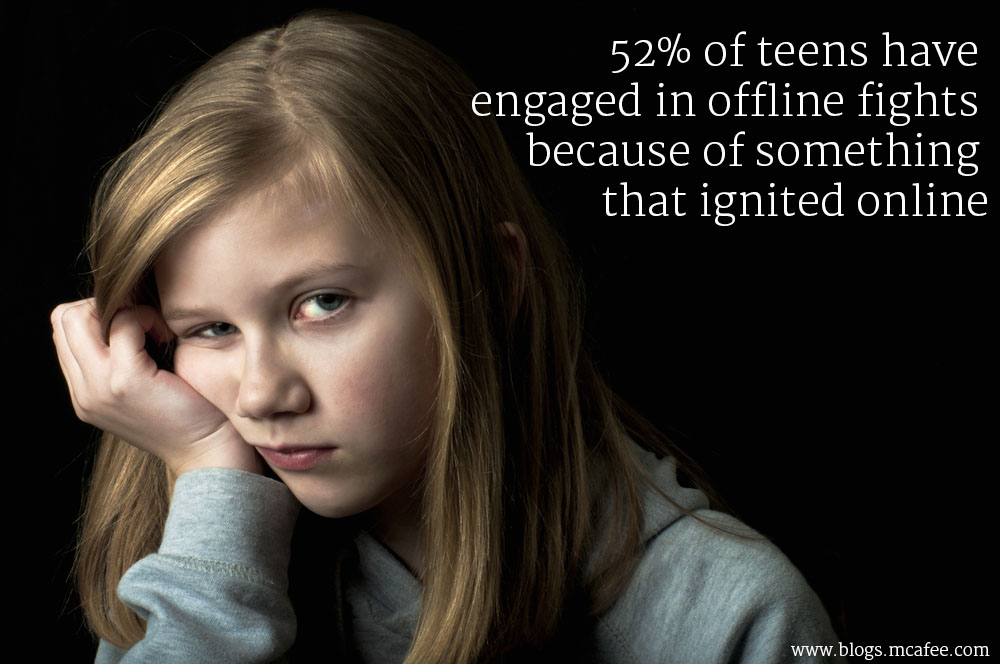“Seriously, sometimes I think some kids are trying to get bullied,” she opined with a frustrated sigh.
I stopped what I was doing and looked up. “What do you mean?”
“They just do the dumbest things online,” my 13 year-old said without looking up and perusing her Instagram feed with the familiar one-thumb scroll. “Like who puts an Ask.fm link in their profile? And who asks everyone to rank their body or new song on a scale of 1-10? I can’t make this stuff up mom.”
I asked her to show me an example. She just turned her screen around and said with a straight face, “Where would you like me to start?”
She was right. Within minutes I read several posts that, no doubt, positioned the user as bully bait. And, it was no surprise, to see that several of the comments attached to the posts anything but kind.
According to a recent study released by ChildLine, a teen hotline in the United Kingdom, the number of children suffering from cyberbullying is increasing. A recent Guardian article stated that the charity saw an 87% rise in contacts (calls) about online bullying, a 41% increase in contacts about self-harm and a 33% increase in young people feeling suicidal. According to ChildLine, self-harm was a major concern, with a 41% year-on-year increase. The number of 12-year-olds mentioning self-harm also increased by 50%.
There’s absolutely no excuse for cyber bullying and victims are certainly not asking to be bullied. There are, however, some online behaviors that may put kids more at risk to be bullied—whether they realize it or not. And it is up to parents to help them see the forest through the trees of the cyber world.
Here are just a few behaviors that could open up a child to cyberbullying:
• Using dangerous apps. Apps like Ask.fm that allow outsiders to ask a user any question anonymously should be off limits to kids. Kik Messenger is also a bad idea. Users have a degree of anonymity with these kinds of apps because they have usernames instead of real names and they can easily connect with profiles that could be (and often are) fake. Both apps have been connected to multiple cyberbullying and suicide cases.
• Oversharing creative works. Your kids may be sharing personal things online—such as songs, poetry, or artwork—that make them more vulnerable to criticism or bullying. Talk with your kids about sharing anything that is especially important to them. While many kids naturally want to share their talents with peers, if the artistic material gets berated online, your child’s self-esteem could take a serious, even irreparable, hit. Coach them on how to be discerning.
• Asking peers for a “rank” or a “like.” Believe it or not, the online culture for teens is such that often kids will be straightforward in asking people to “like” or “rank” a photo of them and attach the hashtag #TBH (to be honest) in hopes of getting an affirmation fix. Talk to your kids about the risk in doing this and the negative comments that may follow. Affirm them and remind them often of how much they mean to you and the people who truly know them and love them.
• Making profiles and photos public. By refusing to use privacy settings (and some kids do refuse), a child’s profile is open to anyone and everyone, which increases the chances of being bullied or personal photos being downloaded and manipulated. We often recommend on this blog that parents require kids under 18 to make all social profiles private—without exception. This limits online circles to known friends and reduces the possibility of cyberbullying, scammers, and online predators.
• Befriending strangers. In an attempt to venture outside their known circles, kids will connect with strangers online. As mature as this feels, it is never a good idea. That 16 year-old who is also having problem with his parents, may actually be 36 years old. The digital landscape is also peppered with trolls and flamers (people who blast others online for sport). Encourage kids to stick to the friends they know and trust to avoid danger zones.
• Keeping quiet. Far too often a child will keep quiet when being bullied which often leads to more bullying and communicates to others that she is fair game for bullying. Encourage your child to come to you at the first sign of bullying or conflict online. Monitor her online circles and assess the tone of her online conversations. She will not be able to discern some sarcasm and cruelty the way you will. Being the object of a cyberbully creates fear, humiliation, and often leads to isolation so your child will rarely be the first to speak up about it. Until they have the skills, parents need to monitor and coach kids online. Start early and be consistent and they will gain their communication chops sooner than later.
Parents, we encourage you to keep communication flowing (not just open). Talk to your child about sensible, balanced sharing online and how every choice they make can either protect them or open them up to harm.
Toni Birdsong is a Family Safety Evangelist to McAfee. You can find her on Twitter @SafeEyes.













